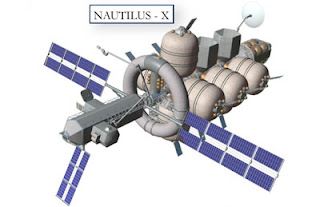Jon Goff's Lunar Patent

On a recent edition of The Space Show, Jon Goff discussed a lunar analogy to the 10 year patent grant awarded to Columbus on trade with any of the lands he discovered. This follows on from the great work done by Mike Mealling at dispelling myths about Columbus' funding which, I believe, he was inspired to do after watching one of my videos. Unfortunately, I think Jon fails to convey his analogy in a convincing way. Being somewhat libertarian, Jon is a little too concerned with where the tax revenue comes from and too specific with who will receive the incentives. This may also simply be a result of the origin of the idea - the analogy to Columbus - and the attempt to describe it as such.
Talking about who will be taxed to fund a government program is never popular. Even "let's tax the rich" is too specific not to leave a bad taste in the voter's mouth. Politicians have learnt that the subject is completely avoidable anyway. Talking about who will receive the bulk of government funding, even in the abstract, is rarely popular. It suggests that the purpose of the program is just to reward cronies or enrich one group over another. Politicians like to talk about having "free and open competition" to select contractors, or however they are handing out taxpayer money. Keeping these elements of modern statecraft in mind, how could the lunar patent concept be sold in today's terms?
I imagine something like this:
"To encourage greater commerce on the Moon, the federal government is offering to pay the majority of lunar launch costs and lunar facility leases for lunar operations. This offer will be valid for the first 10 years of lunar commercialization, which is defined as starting with the establishment of a permanent lunar base by any US non-goverment entity."
More detail could be added as to what exactly the government is subsidizing, but the initiative is sold as a means to reduce the cost of lunar commerce.. not as rewarding first movers. The first movers are required to get the kickoff to happen but it’s up to them to ensure that the government kickbacks come to them and not some latecomer. Thankfully, that's how markets tend to work anyway.
Eventually, someone will inevitably ask how the government is going to pay for this lunar development.. especially if the assumption is that launch costs are going to remain high and lunar facility leases will be in high demand. Assuming you can get a politician to give you a straight answer, the truth may be that they expect taxes collected on lunar commerce will cover the subsidies. They'll trot out an economist who is willing to testify to such and the public will swallow it because, hey, the guy has charts and graphs and stuff.


But a government might also say something like "Ultimately this investment will be paid back many fold when commerce between Earth and the Moon becomes substantial. This is an investment in the future. It is our generation's counterpart of the Virginia colony and the Pilgrims."
ReplyDeleteA government can get away with such a statement. Some non-profit organizations might have sufficient reputation to make that statement without causing alarm. Profit-making companies might encounter a lot of objections from concerned citizens -- especially those conspicuously spending federal money rather than their own.